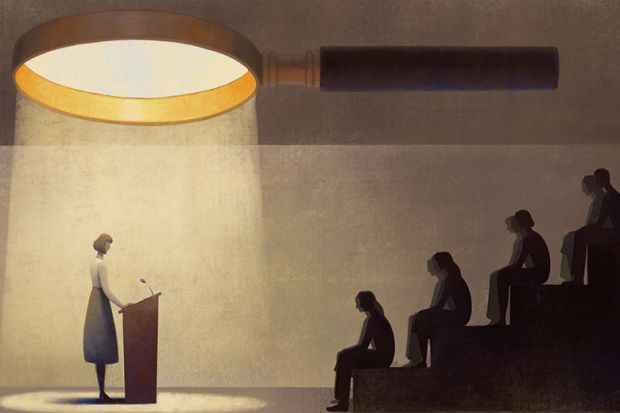Our society is increasingly dependent on the ability of colleges and universities to develop students’ higher-order competencies. As existing occupations are increasingly vulnerable to technological changes, skills such as critical thinking and complex reasoning will allow future workers to adapt to evolving economic opportunities. More importantly at this historic moment, they will also help secure the future of our democratic societies, allowing young people to see past political rhetoric, false news and demagoguery, and to recognise and address the complex social, economic and environmental issues we face as global citizens.
But while colleges and universities are under increasing pressure to deliver high-quality undergraduate education, policymakers and the public have grown increasingly sceptical that faculty are up to the task. Research on undergraduate teaching and learning – including my own 2011 book with Josipa Roksa, Academically Adrift – suggests that large numbers of students pass through college with little asked of them academically and, therefore, with limited cognitive gains. In a recent US cohort of full-time, four-year college students, nearly half reported that during a typical semester they did not have a single class that asked them to write 20 pages over the course of that semester, and a third did not have a single class that asked them to read more than 40 pages a week. These students reported seldom seeing their faculty outside of class and a third reported studying alone less than five hours a week.
More than a third of these students, over four years of college, failed to show any improvement on a standardised assessment of critical thinking, complex reasoning and writing. In our 2014 book Aspiring Adults Adrift, Roksa and I found that when they graduated, they struggled to make transitions to adulthood. They had difficulty finding and holding decent employment, and more than a third of them reported reading the news in print or online only once a month or not at all.
Faculty have a responsibility to respond to these institutional shortcomings and societal challenges. But are they? One powerful critique of higher education is that faculty and administrators are part of the problem as they have been distracted from undergraduate learning by a focus on research. Declining levels of faculty-student interaction are attributed by these critics to academics’ incentive to shirk serious engagement with teaching in order to pursue the scholarship and externally funded research opportunities that lead to career advancement and compensation gains. This focus, it is claimed, is supported by administrators given that, up until recently, institutions were rated primarily on the basis of a combination of their student inputs and faculty scholarly outputs. Hence, a social compact has emerged whereby undergraduates and faculty largely leave each other alone to pursue interests distinct from teaching and learning.
Defenders of the importance of faculty research counter that research is often complementary to undergraduate education. For example, it creates opportunities for undergraduates to engage in authentic, hands-on, project-based endeavours that can be transformative in their developmental reach. Others have noted that faculty who publish are more likely to have job security and, therefore, less likely to abandon rigorous teaching in favour of the entertainment, easy assignments and inflated grades that lead to positive student ratings and renewed contracts. And teachers who are excited about their research are also argued to be able to model and pass on enthusiasm for academic commitment to their students.
This whole argument, however, largely misses the mark. It is not that research itself is, in general, either a substantive threat or of particular service to undergraduate learning. Rather, what is striking to a contemporary observer of higher education is how little academic research is focused on improving undergraduate education.
Faculty in the social, behavioural and institutional improvement sciences have propagated evidence-based approaches, metrics and managerial models in fields as diverse as early childhood education, social service delivery, healthcare and recycling. They have voraciously sought and consumed the administrative data produced by a vast variety of bodies throughout society. Yet, when it comes to conducting research in their own campus communities, they appear to have developed an aversion to using the tools that they have developed.
As things stand, future generations of historians researching early 21st-century higher education will likely be puzzled that many colleges and universities had scores of faculty who could have deployed their skills to improve the lives of young people in their communities, but failed to do so. Yet there is still time to rewrite that future history. Technological changes have created new streams of data from diverse campus sources, including learning management systems, student affairs and assessment. Faculty can and must respond to stakeholder pressure for improved performance in teaching and learning by coming together in research communities to leverage such data.
The future of the kind of liberal society in which universities can thrive might depend on their willingness to take up this challenge – and to recognise it as the research opportunity that it undoubtedly is.
Richard Arum is the dean of the School of Education at the University of California, Irvine. With Josipa Roksa, he is author of Academically Adrift: Limited Learning on College Campuses and Aspiring Adults Adrift: Tentative Transitions of College Graduates. He is giving a keynote address at Times Higher Education's Teaching Excellence Summit, held at the University of Glasgow from 10 to 12 July.
POSTSCRIPT:
Print headline: Does research conflict with teaching? It all rests on the research
Register to continue
Why register?
- Registration is free and only takes a moment
- Once registered, you can read 3 articles a month
- Sign up for our newsletter
Subscribe
Or subscribe for unlimited access to:
- Unlimited access to news, views, insights & reviews
- Digital editions
- Digital access to THE’s university and college rankings analysis
Already registered or a current subscriber? Login








